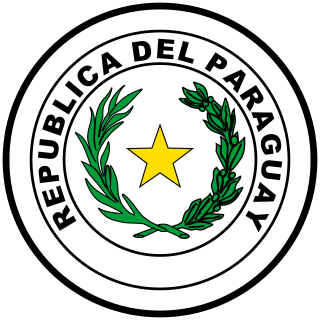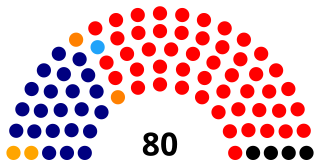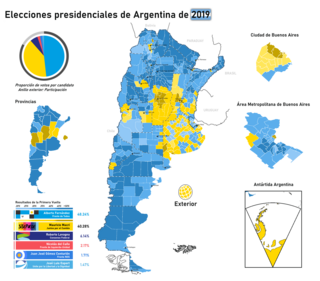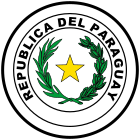
Politics of Paraguay takes place in a framework of a presidential representative democratic republic. The National Constitution mandates a separation of powers in three branches. Executive power is exercised solely by the President. Legislative power is vested in the two chambers of the National Congress. The Judiciary power is vested on Tribunals and Courts of Civil Law and a nine-member Supreme Court of Justice, all of them independent of the executive and the legislature.

The politics of Uruguay abide by a presidential representative democratic republic, under which the president of Uruguay is both the head of state and the head of government, as well as a multiform party system. The president exercises executive power and legislative power and is vested in the two chambers of the General Assembly of Uruguay. The Judiciary is independent from the executive and legislature.

The Chamber of Deputies is the lower house of the Congress of the Union, the bicameral parliament of Mexico. The other chamber is the Senate. The structure and responsibilities of both chambers of Congress are defined in Articles 50 to 70 of the constitution.

The Senate of the Republic, constitutionally Chamber of Senators of the Honorable Congress of the Union, is the upper house of Mexico's bicameral Congress. It currently consists of 128 members, who serve six-year terms.

The Chamber of Deputies(Cámara de Diputados) is the lower house of Paraguay's bicameral legislature, the National Congress. It is made up of 80 members, elected for a five-year term by proportional representation. The other chamber of the National Congress is the Chamber of Senators.

The Chamber of Deputies, officially the Honorable Chamber of Deputies of the Argentine Nation, is the lower house of the Argentine National Congress. It is made up of 257 national deputies who are elected in multi-member constituencies corresponding with the territories of the 23 provinces of Argentina by party list proportional representation. Elections to the Chamber are held every two years, so that half of its members are up in each election, making it a rare example of staggered elections used in a lower house.

Elections in Mexico are held every 6 years to elect a president and every 3 years to elect a legislature. These elections determine who, on the national level, takes the position of the head of state – the president – as well as the legislature.

Romania elects on a national level a head of state – the president – and a legislature. The president is elected for a five-year term by the people. The Romanian Parliament has two chambers. The Chamber of Deputies has currently 330 members, elected for a four-year term by party-list proportional representation on closed lists. The Senate has currently 136 members, elected for a four-year term by party-list proportional representation on closed lists.

Bolivia elects on national level a head of state – the president – and a legislature. The president and the vice-president are elected for a five-year term by the people. The National Congress has two chambers. The Chamber of Deputies has 130 members, elected for a five-year term using the Additional Member System, and in the case of seven indigenous seats by usos y costumbres. The Chamber of Senators has 36 members: each of the country's nine departments returns four senators allocated proportionally.
Elections in Colombia are regulated and controlled by the National Electoral Council which provides information on elections and election results in for the politics of Colombia.

Equatorial Guinea elects on the national level a head of state – the president – and a legislature. The president is elected for a seven-year term by the people. President Teodoro Obiang Nguema Mbasogo was re-elected unopposed on 15 December 2002. The Chamber of People's Representatives has 100 members, elected for a five-year term by proportional representation in multi-member constituencies.

Elections in Uruguay encompass three different types: general elections, departamental elections and municipal elections. At the national level, Uruguay elects a head of state and a legislature. Voting is compulsory and extends to all citizens aged 18 and over.

The Plurinational Legislative Assembly is the national legislature of Bolivia, placed in La Paz, the country's seat of government.

The Chamber of Deputies is the lower house of the Plurinational Legislative Assembly of Bolivia. The composition and powers of this house are established in the Political Constitution of the State. The session room is located in the Legislative Palace building in Plaza Murillo.

The Chamber of Deputies is the lower house of the Parliament of Equatorial Guinea.

The Chamber of Representatives is the lower house of the General Assembly of Uruguay. The Chamber has 99 members, elected for a five-year term by proportional representation with at least two members per department.

The Chamber of Senators of Paraguay, the upper house of the National Congress, has 45 members, elected for a five-year term by proportional representation.

General elections were held in Dominican Republic on 15 May 2016 to elect a president, vice-president and the Congress, as well as 20 deputies to the Central American Parliament, municipal councils, mayors and vice mayors. On 15 May 2015 Roberto Rosario, president of the Central Electoral Board, said that there would be about 4,300 seats up for election in the "most complex elections in history".

General elections were held in Paraguay on 22 April 2018. President Horacio Cartes and Vice-President Juan Afara of the Colorado Party were not eligible for re-election. The presidential elections were won by the Colorado Party's Mario Abdo Benítez, who defeated Efraín Alegre of the GANAR alliance. The Colorado Party also won the most seats in the Senate and Chamber of Deputies. The new President and Vice-President took office on 15 August 2018 and left office in August 2023.

General elections were held in Argentina on 27 October 2019, to elect the president of Argentina, members of the national congress and the governors of most provinces.


















